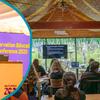No matter how vast and mysterious the Ocean seems, there is one place where its wonders can be discovered up close and personal - aquariums. Aquariums play a pivotal role in promoting education, fostering Ocean Literacy, cultivating a deeper understanding and appreciation of our Ocean.
Aquariums provide a unique platform for visitors to witness the diverse beauty of the Ocean first-hand. With captivating exhibits showcasing vibrant coral reefs, mesmerising schools of fish, large predators, these immersive environments transport visitors into the heart of the underwater world. Each tank tells a story, unravelling the intricate relationships between species and ecosystems, fostering a sense of wonder, and igniting a desire to protect these fragile environments.
Beyond the mesmerising displays, aquariums excel in creating interactive learning experiences that captivate all generations. Through immersive exhibits, workshops, school visits, shows and unique experiences lead by dedicated staff, visitors can explore anything from the fascinating adaptations of Ocean creatures, to engaging in habitat restoration projects, and taking a deeper dive into more difficult conservation topics. Educational programs tailored for schools and families empower young minds with knowledge about marine ecosystems, conservation strategies, and the importance of sustainable practices. By nurturing a love for the Ocean from an early age or as a family unit, aquariums lay the foundation for lifelong environmental consciousness and responsible decision-making - shaping Ocean citizenship.
The National Marine Aquarium (NMA), who are owned and run by the Ocean Conservation Trust, is dedicated to creating meaningful and fun experiences that allow people to connect with the Ocean in a positive way. We design all our engagement and learning programmes around our fully evaluated Ocean Literacy Pathway. The first step on this pathway is to experience and participate, we aspire to create interactions that are not one-off events but leave a lasting impression. The next step is discovery and learning, using fun experiences to foster learning opportunities. The final step in the pathway is to connect and act, this combination of experiencing the Ocean for themselves, having some understanding of it and having a personal connection with it, leads to a greater chance of an individual taking action to protect it. The individual can join the pathway at any stage and even the most Ocean literate person still has something to learn and a new way to connect with the Ocean, this makes our pathway a continuous cycle.
Aquariums are committed to promoting Ocean Literacy, not just within their buildings but also beyond their walls. At the NMA, our activities range from interactive visits to the aquarium for schools and families, hands on educational workshops, behind the scenes tours, and toddler clubs, to snorkel safaris, rockpooling, teenage holiday clubs, school outreach and boat trips around the National Marine Park. We try and create something for everyone, so that anyone can connect with the Ocean in their own preferred way. This includes virtual interactions, so that we can create a truly accessible programme of experiences. Our schools programme offers virtual aquarium tours for classes that can’t make their way to the NMA, we offer virtual reality experiences both in the aquarium, to bring inaccessible habitats, such as the deep sea, to life, as well as outside the aquarium in care homes, hospital wards and day centres. By leveraging technology, aquariums engage with individuals around the world, disseminating valuable information, and encouraging a global community dedicated to protecting our Ocean.
Aquariums are not just windows into the underwater world, they also serve as vital hubs for conservation and research. The Ocean Conservation Trust actively participates in efforts to protect and restore seagrass habitats, fund global Ocean conservation and engagement projects, and contribute to scientific research. By promoting public awareness about the challenges facing our Ocean, our aquarium inspires individuals to act, which in turn supports our charities conservation and research efforts.
In a world where Ocean ecosystems face increasing challenges, the role of aquariums in promoting education and Ocean Literacy has never been more vital. By providing awe-inspiring exhibits, interactive learning experiences, and engaging conservation initiatives, these institutions empower individuals to become passionate advocates for our Ocean. Together, we can ensure the future health of our Ocean for generations to come.
Helen Reed – Public and Community Engagement Manager, Ocean Conservation Trust
All blogs reflect the views of their author and are not a reflection of BIAZA's positions.
Related Members
-
News
 Blog: Why Hosting a BIAZA Conference Matters 3rd March, 2026For this week's blog, Chris Eley (Hertfordshire Zoo) recounts the value of hosting a BIAZA event in 2025: In November 2025, we hosted the BIAZA…
Blog: Why Hosting a BIAZA Conference Matters 3rd March, 2026For this week's blog, Chris Eley (Hertfordshire Zoo) recounts the value of hosting a BIAZA event in 2025: In November 2025, we hosted the BIAZA… -
News
.png?w=100&h=100&zc=1&f=jpeg&hash=97e6d151315c515d23f80e6ee9d1d533) BIAZA Blog: How Accreditation is creating change at BIAZA 25th February, 2026After two years of BIAZA Accreditation, the team delivers a look ahead on the programme to support and boost world-class zoos…
BIAZA Blog: How Accreditation is creating change at BIAZA 25th February, 2026After two years of BIAZA Accreditation, the team delivers a look ahead on the programme to support and boost world-class zoos… -
News
.png?w=100&h=100&zc=1&f=jpeg&hash=a0b01e801771c24b4d7f5c3df4abed98) Twycross Zoo Welcomes Its First Baby of 2026: An Endangered Pileated Gibbon 19th February, 2026Conservation charity, Twycross Zoo, is celebrating a heart-warming milestone with the arrival of its first baby of 2026 - an endangered pileated gibbon,…
Twycross Zoo Welcomes Its First Baby of 2026: An Endangered Pileated Gibbon 19th February, 2026Conservation charity, Twycross Zoo, is celebrating a heart-warming milestone with the arrival of its first baby of 2026 - an endangered pileated gibbon,…


